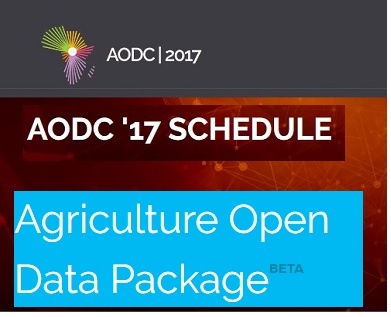Count down to the 2017 Africa Open Data Conference (17-21 July) ...& focus on AgPack

.jpg)
The 2017 Africa Open Data Conference will take place next week in Accra, Ghana and will bring together over 600 delegates drawn from all over Africa and the world at large. On July 20th, 2017, there will be a capacity development policy session focussed on Agricultural Open Data Package (AgPack) and all interested are invited to attend and contribute to the discussions.
_________________________________________________________________________________________________
To learn more about AgPack ...
The Food and Agriculture Organization of the United Nations (FAO) in partnership with the Global Open Data on Agriculture and Nutrition (GODAN) are inviting interested individuals to participate in the online discussion on 'Agriculture Open Data Package' to be held on the e-Agriculture Platform.
The initial target audience are policy-makers, researchers, open data experts, and/or agricultural experts - however, any interested individuals are invited to participate.
This forum discussion follows immediately after the e-Forum on ICTs and Open Data in Agriculture and Nutrition.
Register to e-Agriculture and take part in the e-Forum discussion on the Agriculture Open Data Package (10 - 24 July 2017). You will need to log on to the e-Agriculture platform with your username and password in order to post on the e-Agriculture Forum. Once you are logged in you can comment on the forum question directly on e-Agriculture. |
The purpose of this e-forum discussion
The purpose of this discussion is to reach out to the potential users of the e-Agriculture Community of Practice (CoP) to get feedback on the Agriculture Open Data Package (AgPack) and its usability. First the content of the AgPack as a resource for governments to develop their own open data strategies will be explained, and; next, the emphasis will be on the collection of your stories:
- What do you consider as the key data sets for agriculture?

- Why do you or others need them?
- What are your examples of governments putting open data into action to enforce their agricultural sector?
- What were the hurdles that they had to overcome to realize this strategy?
The Agriculture Open Data Package Working Group is going one step further from versions Beta to Alpha. In order to do so, the AgPack needs critiques from people in the field to answer questions like;
- Would this resource be useful to me?
- Do I agree with the current analysis?
- How would you recommend implementing the AgPack into policy?
About the Agriculture Open Data Package (Agpack)
The Agriculture Open Data Package (AgPack) is a resource for governments to to take the next step in publishing open data they have generated or collected.
The AgPack suggests 6 policy areaswhere open data can support the agricultural sector and identifies 14 data categories to realize impact in the agricultural sector. For each data category the potential use of the data by the agricultural sector and the estimated effort to publish this data from government sources are discussed and examples of implementation and initiatives that support the interoperability of each data category are provided.
The AgPack also highlights 10 examples of open data in action demonstrating how governments are harnessing data to address sustainable agriculture and food security around the world.
Your feedback will be requested in form of response to the e-forum discussion http://www.e-agriculture.org/forums/discussions/e-forum-discussion-agriculture-open-data-package-agpackinfo. There are three sections that will require your input:
|
e-Agriculture team encourages you to subscribe to the discussion so you receive via your e-mail the contributions from other colleagues.
For more information contact e-Agriculture

